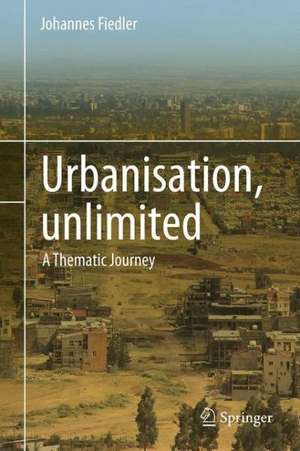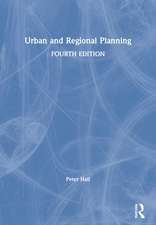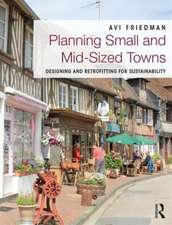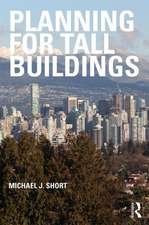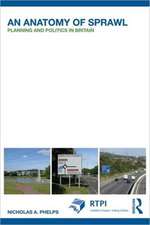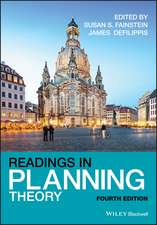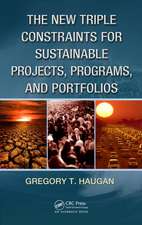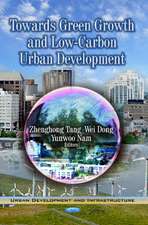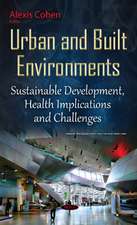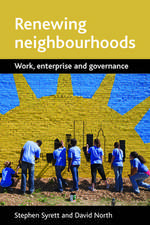Urbanisation, unlimited: A Thematic Journey
Autor Johannes Fiedleren Limba Engleză Hardback – 17 iun 2014
To “condemn the reality” of global urbanization “is fruitless”, writes Johannes Fiedler in this unlimited view of a world of constant motion, subject no longer to just its planetary rotations, but also to the constant push and pull of its various populations, some of whose giant constructionsshift the earth’s axis.
From the foreword by Lars Lerup
| Toate formatele și edițiile | Preț | Express |
|---|---|---|
| Paperback (1) | 635.15 lei 6-8 săpt. | |
| Springer International Publishing – 17 sep 2016 | 635.15 lei 6-8 săpt. | |
| Hardback (1) | 641.20 lei 6-8 săpt. | |
| Springer International Publishing – 17 iun 2014 | 641.20 lei 6-8 săpt. |
Preț: 641.20 lei
Preț vechi: 754.36 lei
-15% Nou
Puncte Express: 962
Preț estimativ în valută:
122.69€ • 128.45$ • 101.52£
122.69€ • 128.45$ • 101.52£
Carte tipărită la comandă
Livrare economică 05-19 aprilie
Preluare comenzi: 021 569.72.76
Specificații
ISBN-13: 9783319035864
ISBN-10: 331903586X
Pagini: 190
Ilustrații: XI, 175 p. 75 illus. in color.
Dimensiuni: 155 x 235 x 18 mm
Greutate: 0.44 kg
Ediția:2014
Editura: Springer International Publishing
Colecția Springer
Locul publicării:Cham, Switzerland
ISBN-10: 331903586X
Pagini: 190
Ilustrații: XI, 175 p. 75 illus. in color.
Dimensiuni: 155 x 235 x 18 mm
Greutate: 0.44 kg
Ediția:2014
Editura: Springer International Publishing
Colecția Springer
Locul publicării:Cham, Switzerland
Public țintă
GraduateCuprins
Wild Urbanism.- Introduction and Acknowledgements.- Abstraction.- Brazilianisation.- Convergence.- Dispersion.- Expansion.- Gentrification.- Hegemony.- Modernisation.- Privatisation.- Regulation.- Segregation.- Urban Space.- Vitality.- Afterword.- References.
Notă biografică
Johannes Fiedler is an architect and urban planner with a 25-year career as an international urban consultant. He has engaged in numerous projects in Europe, Africa and the Middle East. In the academic field, he has conducted research on global urbanisation issues and holds a doctoral degree in urban planning and contemporary history. For the past ten years he has been lecturing in urban design and planning at universities in Austria, Germany and, most recently, Ethiopia. His current research focuses on public space and spatial justice face is an architect and urban planner with a 25-year career as an international urban consultant. He has engaged in numerous projects in Europe, Africa and the Middle East. In the academic field, he has conducted research on global urbanisation issues and holds a doctoral degree in urban planning and contemporary history. For the past ten years he has been lecturing in urban design and planning at universities in Austria, Germany and, most recently, Ethiopia. His current research focuses on public space and spatial justice.
Textul de pe ultima copertă
In a series of essays, the process of urbanisation – a human mega-trend acquiring unprecedented scale and speed as globalisation proceeds – is examined in the most diverse contexts and stages of development. Drawing on scientific references and identifying recurring themes like dispersion, privatisation and vitality, Fiedler devises the glossary for a cross-cultural understanding of the global urban system emerging. Images and anecdotal evidence reconnect these themes to local realities. The tone of the essays conveys a post-voluntarist attitude, derived from many years of professional experience – critical of both neoliberal practices and determinist ideas.
To “condemn the reality” of global urbanization “is fruitless”, writes Johannes Fiedler in this unlimited view of a world of constant motion, subject no longer to just its planetary rotations, but also to the constant push and pull of its various populations, some of whose giant constructionsshift the earth’s axis.
From the foreword by Lars Lerup
To “condemn the reality” of global urbanization “is fruitless”, writes Johannes Fiedler in this unlimited view of a world of constant motion, subject no longer to just its planetary rotations, but also to the constant push and pull of its various populations, some of whose giant constructionsshift the earth’s axis.
From the foreword by Lars Lerup
Caracteristici
An effective insight is given into the workings of urbanisation without requiring scientific background Unique cases embedded in broader analytical reasoning The book appeals to architects interested in urban development
